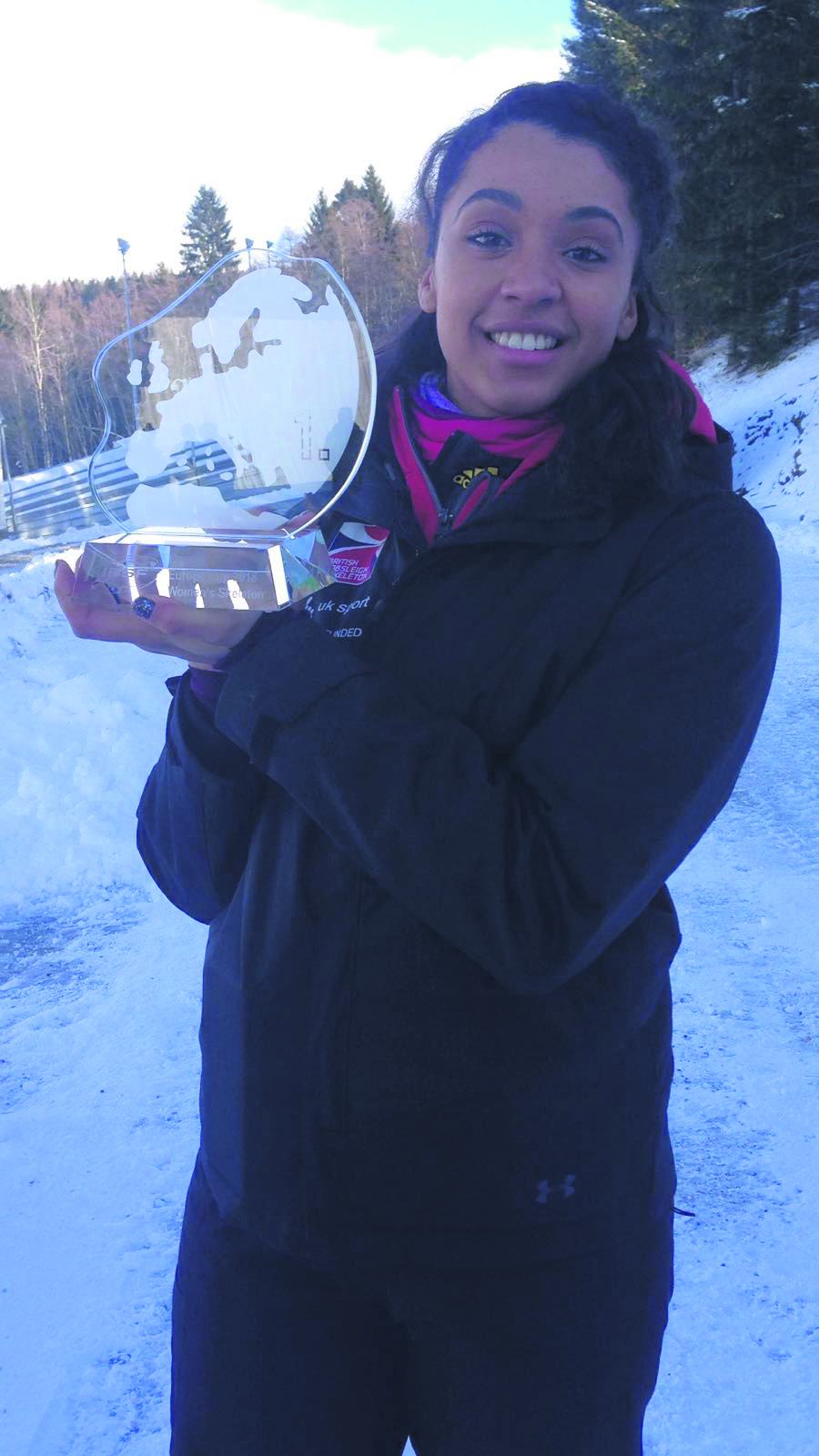By Rachel Steinberg
MOORSIDE’S Brogan Crowley is close to qualifying for her first Olympic Games and a chance to emulate heptathlon hero Jessica Ennis-Hill.
But if the Saddleworth skeleton star, 27, had a chance to sit down with her idol, she wouldn’t be asking the London 2012 champion for competition advice as she has loftier things on her mind.
Brogan joined the British Skeleton programme in 2014 through the Power2Podium talent ID scheme, but a nightmare series of injuries led to a succession of ‘broken’ seasons. With momentum and health now back on her side, the former GB junior heptathlete, who also represented Great Britain U20s in indoor pentathlon, long jump and 60m hurdles, has found plenty to admire in her idol, who won silver in Rio after giving birth to son Reggie.
With momentum and health now back on her side, the former GB junior heptathlete, who also represented Great Britain U20s in indoor pentathlon, long jump and 60m hurdles, has found plenty to admire in her idol, who won silver in Rio after giving birth to son Reggie.
“I’d ask how she found the motivation to come back, especially after she had children,” said Brogan who is one of more than 1,000 athletes who are able to train full-time, access to the world’s best coaches and benefit from pioneering technology, science and medical support thanks to vital National Lottery funding.
“Because I think that’s what I find more inspiring than anything. Especially around a lot of doubt and uncertainty because I’ve had that as well.
“Like the last few years, can I do it? Should I do it? And how does that start to affect what you’re doing long term.
“With her it’s children, but for me it’s just more injury-focused. I think I’d like to hear what she has to say about that.”

There’s only one problem with aiming to follow in Ennis-Hill’s footsteps as Brogan has not been able to feel her own foot for the past two or three years.
Back in her heptathlon days, Brogan had bone removed from her ankle which should have been a straightforward operation.
The former St Chad’s and Saddleworth pupil said: “Something in the surgery didn’t go quite right, and I ended up with nerve damage.
“I’d severed a nerve in my foot. I’ve just had to manage training and adapt everything, but I think we’re in a good place now where we’ve figured out what I can tolerate.”
It’s an astonishing feat for an athlete whose sport requires a 40-metre sprint before a headfirst sled slide, reaching speeds above 80 miles an hour.

Brogan, who is based with British Skeleton at the University of Bath, finished 17th in last season’s skeleton World Cup rankings, with a new series of critical Olympic qualification events, including World, Europa and Intercontinental Cup competitions now underway.
The top-ranked 25 men and women – a maximum of three of each gender per country – will tickets to the Beijing 2022 Olympics in Beijing which begin in February.
British women have dominated skeleton since the sport was reintroduced at the Salt Lake City Olympics in 2002, after a 54-year absence.
Alex Coomber, racing with a broken wrist, won bronze for Britain in Utah, kicking off an astonishing run for British women, with Shelley Rudman sliding to Turin silver before Amy Williams took the top step at Vancouver 2010. Lizzy Yarnold became the first British Olympian to defend a title PyeongChang in 2018, where she shared the podium with third-placed team-mate Laura Deas.
That is medals at five consecutive Games and three back-to-back golds.
Brogan, who graduated in English and sports science from Loughborough University, would be thrilled to carry on the legacy, explaining “I’ve always wanted to be in the Olympics.
“And it would be even more rewarding for me, given all the injuries that I’ve been through.
“I’ve been through so much and the resilience I’ve had to show just makes me appreciate everything so much more.
“I know I’ve got a chance or I would be given a chance that not many other people get or can do. It would just mean the world.”
Brogan was looking for a new sporting challenge and took up skeleton bob after the Sochi Winter Olympics in 2014 after seeing an advertisement for a Power2Podium Day.
She was one of eight to be selected from more than 1,000 applicants for places on the GB Talent Squad and has since progressed to the Elite Squad.
No one does more to support our Olympic and Paralympic athletes than National Lottery players, who raise more than £30 million each week for good causes including grassroots and elite sport. Discover the positive impact playing the National Lottery has at
www.lotterygoodcauses.org.uk and get involved by using the hashtag: #TNLAthletes


